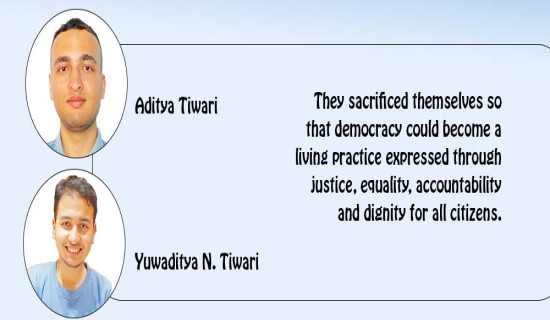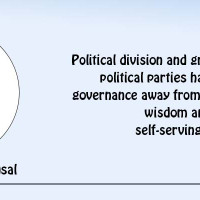- Friday, 30 January 2026
Ways To Upgrade Public Schools
Nepal aims to become a middle-income country by 2030. This goal can be realised only through building human capital by delivering quality education. For this, the enhancement of community-managed schools is a must. In Nepal, around 80 per cent of students attend public schools while the private schools serve the rest 20 per cent. The disparity in the quality of education delivered by these two types of schools always gets vividly mirrored in the national-level examinations. Therefore, owing to the unquestionably poor educational system, materialising the nation’s vision seems to be a far cry.
This year alone, according to the National Examinations Board (NEB), of 363,008 students who appeared in the grade 12 examinations, only 48 per cent passed. On the other hand, a large number of educated youths are unemployed. Reports, unveiled by the International Labor Organisation (ILO), show that 26.1 per cent of university graduates are unemployed in Nepal. These two grave issues pose a question: what has our educational system prepared the young generations for?
Access to education
To expand the public’s access to education, and to improve the quality of education through assured funding and technical support, all schools across the nation were nationalised with the inception of the National Education System Plan (NESP) in 1971. However, the nationalisation of schools failed to serve the expectation of both the government and the public; it turned out to be just a setback. So, the government reversed its course nine years later in 1980 and let the door open to for-profit schools. In 2002, the government embarked on the transfer of management of schools to the community by offering all communities the option of taking over these schools financed on a grand block basis.
In recent years, there has been substantial improvement in the physical facility of public schools; majority of them are built with the aids of international agencies. Nevertheless, the services delivered by them are still pathetic. This is due to a low budget allocation by the government, poor quality of instruction, lack of parents’ participation in school affairs, lack of organisational efficiency of schools, poor school-community relations and lack of transparency of school activities, poor leadership quality, and weak school governance. Their capacity should be developed through training, study tour, and technical and professional support.
Though each school is unique in the distinctive features of its stakeholders, the practices which have been effective in private schools may not be effective in public schools. However, many suitable practices can be adopted. Owing to effective management, qualified principals, monitoring, and a structured system to create accountability and ownership among the teachers, the service delivered by the private schools is praiseworthy. Despite the investment of the government, and good incentives for the teachers, public schools have fallen behind in terms of delivery of quality education.
For transforming or strengthening the public educational system, the government should heavily invest in it. With this, the public education system can be strengthened to some extent. However, to our misfortune, while children continue to suffer serious education setbacks due to COVID-19 closures, only 11 per cent of the total budget has been allocated for education for the fiscal year 2021/22.
The private schools, instead of only being profit-oriented, should grow themselves as the support system to assist any public institutions that require assistance. They can share their practices with public schools and assist in the teachers' training. Similarly, public schools can forge a partnership with private schools and universities that offer an educational degree for expertise and knowledge sharing. Such collaboration and sharing aid public academic institutions grow towards excellence. Also, the government can take an initiative to ensure the provision of a platform for the educational professionals of both private and public schools where they can share their experiences and learn from each other. But, sadly, most of the structured teachers’ development programmes are run in isolation, either for public school teachers/managers or for private ones.
In many private schools, teachers are encouraged or retained to teach at a particular level for years either by incentivising them in a better way or through other means. This yields better results. Unfortunately, in public schools, owing to large differences in salaries between the primary level and secondary level teachers, the teachers, who teach in lower grades, tend to apply for higher grades with the hope of getting better perks and incentives. This instability of teachers at a particular level owing to incentives has adversely affected the learning outcomes of the learners. In case the benefits are equalised, the good teachers at a particular level will continue to remain at the same level, contented, yielding better results.
Recruitment processes
To strengthen public schools, some ill professional practices must end. For an instance, it is not surprising to witness bureaucrats, politicians, and trade unions easily interfering in teachers' recruitment processes, with no suitability of teachers and their skills in the public schools. The vacancies have to be filled up through competitive recruitment processes without external interference. In addition, the government should build a strong, structured system to closely monitor or shine spotlights on deficiencies in public schools to make them more accountable. For an instance, data on public schools, including graduation rates, attendance of teachers and students, student enrollment rates, and school activities should be made accessible to the public.
In a nutshell, ‘quality education is one of the Sustainable Development Goals. The government should enhance the public educational system. For this, it should allocate the education budget as per the global commitment of 20 per cent of the national budget for the education sector. The private schools need to grow themselves as the support system for the public schools, and the local government should forge the partnership with the private schools and the universities for the expertise and knowledge sharing. All sides should work hand-in-hand as a lonely rooster cannot bring dawn!
(Lama is the head of the English department at Elite Grand School. babulama1989@gmail.com)

















